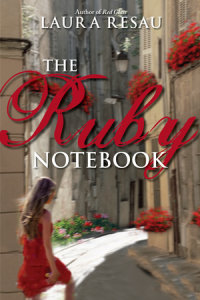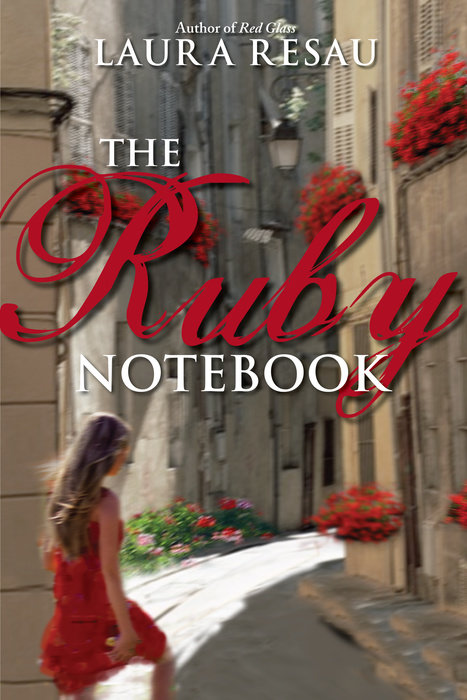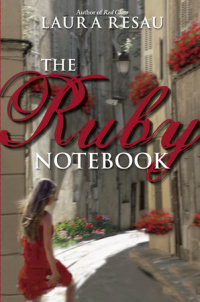One
It’s true. There’s something about the light here. It’s hazy golden, as if it’s moving through honey. I’ve seen all kinds of light. Wet green glow in the Amazonian jungle, squid luminescence in the Pacific, indigo dawns through a waterfall in the Andes. But this particular light—this southern French light glinting off my tiny espresso cup—this is something else.
It hits me now, the familiar urge to e-mail Wendell. It’s a hunger that needs to be satisfied every three or four hours. A split second later, the rational part of my brain kicks in, and I remember he’ll be here in a week. June twenty-fifth, the day filled with unabashedly giddy hearts and exclamation points on my calendar. He’ll be here, in Aix-en-Provence, in this square, and we’ll actually be touching, and this light will be settling on his skin. He’ll be hopping up to snap pictures through the fountain spray, catching the cloud of pigeons alighting on an old man’s shoulders, a miniature dog nonchalantly making a large pile of merde as the owner, unaware,…
One
It’s true. There’s something about the light here. It’s hazy golden, as if it’s moving through honey. I’ve seen all kinds of light. Wet green glow in the Amazonian jungle, squid luminescence in the Pacific, indigo dawns through a waterfall in the Andes. But this particular light—this southern French light glinting off my tiny espresso cup—this is something else.
It hits me now, the familiar urge to e-mail Wendell. It’s a hunger that needs to be satisfied every three or four hours. A split second later, the rational part of my brain kicks in, and I remember he’ll be here in a week. June twenty-fifth, the day filled with unabashedly giddy hearts and exclamation points on my calendar. He’ll be here, in Aix-en-Provence, in this square, and we’ll actually be touching, and this light will be settling on his skin. He’ll be hopping up to snap pictures through the fountain spray, catching the cloud of pigeons alighting on an old man’s shoulders, a miniature dog nonchalantly making a large pile of merde as the owner, unaware, studies a dress in a shop window.
Across the café table, Layla picks up her little bowl of lemon glâce and tilts her head back to pour the last melted drops in her mouth. Not the kind of thing the well-?mannered French people surrounding us would even think of doing. I know my mother so well, I can guess why she does it. It’s not just because everything’s so expensive in Aix—although that drop of glâce is probably worth ten centimes. That’s just Layla, savoring the tiniest droplets, sucking every bit of sweetness from life. Which is maybe why we move to a different country every year. Sixteen countries in my sixteen years on earth. It doesn’t take her long to lick a place clean.
She gazes over my head. “Doesn’t everything here look edible, Zeeta?”
“Edible how?” I can’t help smiling. We’ve been here a week, already over the jet lag but still marveling at every novel detail. It’s amazing; not a single sarcastic comment has emerged from my lips all week. Layla and I have been like sisters adventuring together, probably because I’m insanely happy about Wendell coming.
Best of all, he’ll be staying in our apartment. I’ll see him every day for two months, enough to make up for nine whole months apart. While I was getting his room ready this morning, I had a goofy smile on my face, just imagining breakfast together at our sunny kitchen table, dinner on our roof patio. Almost too good to be true.
“Look at those buildings, love.” Layla waves her arm, her bracelets clinking. “They’re like sugary, buttery desserts.”
I nod. “Crème brûlée.” All the buildings—shops, cafés, bakeries, post office, town hall—are painted in the same dessert palette. This honey haze has oozed into everything, even the people. They’re draped in pale creams and lemons and silvers. They even talk in milky hues, their lips pursed and cheeks sucked in to form sexy French vowels.
Layla leans in. “Don’t you love that we’re living in a place pronounced ‘X’? Like X marks the spot. Like there’s a hidden treasure here! Like it can be whatever we want it to be! C’est magnifique!” She blows a kiss at the sky.
“He’ll like it here,” I say. Layla knows the he I’m talking about. For nine months, she’s heard me find roundabout ways to work Wendell into every conversation.
“Is his room ready?” she asks.
“Clean sheets, empty chest drawers, space in the wardrobe, a shelf in the medicine cabinet. All set.” He’ll be moving into my room, and I’ll sleep on the sofa bed in the living room.
“Hyper cool,” she says, pronouncing it the French way. “Eep-air” cool. A few months ago in Ecuador when I told her my plan to have Wendell stay with us this summer, she just said, “¡Que pleno!”—“Cool” in Spanish. The idea of my boyfriend sharing our apartment didn’t faze her one bit. She’s more like a sister than a mother, young-looking enough that people often ask if we’re doing our junior year abroad together, pretty enough that random college backpackers turn to ogle. Even on windless days, her blond hair flies wild behind her, trailing along like a comet’s tail. “It’ll be good to have him around again,” she says. “Other artists inspire me.”
Just what kind of artist Layla considers herself is hard to get a handle on. Life is her canvas, each country a brushstroke of a different color. Wendell’s another type of artist—a photographer, slow and thoughtful with his craft. But what I love most about him is just him. His presence. How it feels to be near him. I imagine kissing him goodbye as he leaves for classes, and meeting him in the afternoons to wander the town together, meandering through the markets, hanging out at cafés.
Still, there’s a piece of me that’s wary, sure that this is too good to be true, a piece of me prepared to have my heart torn apart. My heart has been torn apart, over and over, every year, every time we say goodbye to our home. Still, somehow, over the course of a year in the new home, my heart heals and hopes and loves . . . only to be torn apart again.
• • •
One afternoon when I was eight years old, in the highlands of Guatemala, I spent hours playing with my best friend, Paloma, at our magical waterfall fort in the woods. As we headed home I remember feeling at the pinnacle of happiness, flying through the door with her, rosy-cheeked and breathless and laughing. Layla gave us both big hugs and said, “Oh, love, I have good news! We’re going to Morocco next week!”
And with those words, Paloma and my magical waterfall fort were snatched away. It was a heavy, falling, crushing feeling. A giant tree smashing to the ground.
The worst part of leaving Guatemala was saying goodbye to Paloma’s father, who I’d come to think of as my own, even calling him Papá. He doted on me, telling Paloma and me how much we looked alike. And we did. My skin was just a shade lighter than hers. Our eyes were wide and brown, our hair black and straight and long, and our cheekbones high.We fantasized that we really were sisters. . . .
Saying goodbye to Paloma’s father made my lack of a father grow into a huge, empty void. That’s when I first started bugging Layla about my own father, when I learned that I was the product of a one-night stand on a Greek beach. She didn’t even know his name, only the initials J.C. And that’s when she told me that my chances of meeting my father were zero.
Over the years I searched for his face in every crowd. I had no idea what he looked like, but I assumed I’d magically recognize him. Little by little, with each face that wasn’t his, I realized Layla was right. I’d never know him. I’d have to accept it.
And I have. Except for a tiny piece of me, a piece located not in my mind but in my stubborn heart, the piece that skips a beat whenever I meet a J.C., the piece willing to risk being torn apart once again.
• • •
Across the café table from me, Layla tilts back her head, letting her blond hair cascade down the back of her chair, closing her eyes like a cat, relishing the warmth. She knows how to be happy. Her happiness isn’t clouded by the sense of impending doom that mine is. No, she dives into the moment, forgets the past, doesn’t worry about the future. Which is what she appears to be doing now, bathing in sunlight, full of lemon glâce.
“Beauty constantly wells up,” she murmurs, “a noise of springwater in my ear and in my inner being.” It’s Rumi, her favorite thirteenth-century mystic. She quotes him so often I feel as if he’s part of our family—adored by her, tolerated by me.
And then, as though she’s conjured it up, a sound bursts forth like springwater, like a fountain suddenly turned on. Music, a rushing, churning, chaos of music, spurting out from under a tree next to us. It’s like a carousel song that flew away and crashed into a gypsy caravan and burst into flames of polka. There’s a whirlwind of accordion, trumpet, and bongos, each one shooting out notes like squiggly fireworks. The melody swirls around slowly at first, gathering momentum, and then explodes.
The musicians’ clothes, all in shades of red, are patchworks of satin, corduroy, velvet, and silk, sewn with an odd assortment of items—feathers and beads and little plastic dolls and tiny cars and bottle caps and paper clips and shells. These people do not match the milky-smooth surroundings. Not by a long shot.


